A Look At ReOpen NC — And What Dan Forest Thinks About COVID-19 And Stay-At-Home
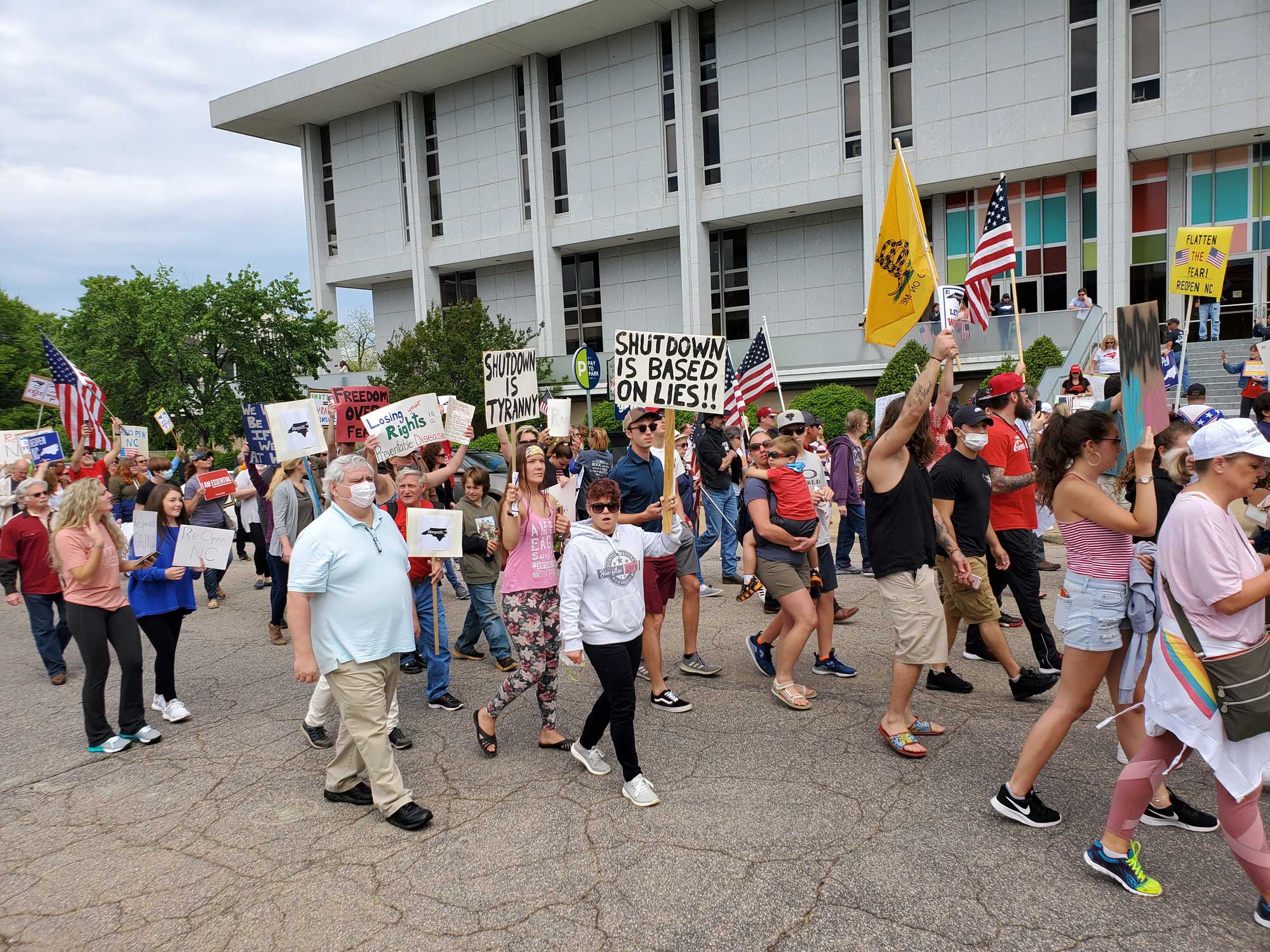
In this week’s episode of Inside Politics, we look at the burgeoning ReOpen NC movement, and what that means for politics in North Carolina.
What is this group? How many people does ReOpen NC speak for? What kind of influence does it have? Is it purely about reopening the state’s economy or is it a larger movement that will continue after the state lifts restrictions?
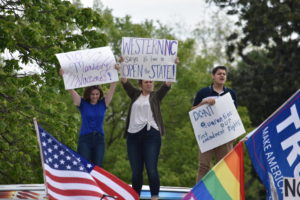
And we’ll also have a conversation with Republican Lt. Gov. Dan Forest, who is Gov. Roy Cooper’s opponent in the general election. He wants Cooper to lift the blanket statewide stay-at-home order, which last week was extended until at least May 8.
We will also recap the latest Charlotte City Council skirmish over the RNC. It came Monday night, in a 6-5 vote, of whether to accept a $50 million federal security grant for the convention.
Forest did not attend the second ReOpen rally on April 21, though he did speak with the organizers by Zoom before they began their protest.
“I talked to them and, you know, encouraged them to be safe and, you know, stay distant from one another to follow all the rules, to do it the right way to show the state that people can be responsible,” Forest said.
At Tuesday’s ReOpen NC rally – the third one – at least four people were arrested, including one of the leaders, Ashley Smith of Morganton. She made a Facebook video Tuesday night for the group’s private page after being released from jail.
And one of the leaders of the ReOpen NC movement broke ties with the group. She was upset that what she thought was a non-violent movement had turned ugly.
At the second ReOpen NC rally, it seemed like a miniature Make America Great Again rally.
There were about 500 people. There were many Don’t Tread on Me flags, and people wearing T-shirts supporting the president. There was even a guy with a table selling Trump merchandise.
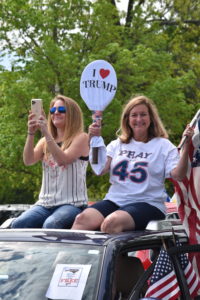
“A month ago when it first started I was concerned — very concerned. It was very scary,” David Armiento said. “And I understood the first closing, I said, ‘OK, we can give up a little bit for the safety of all.’ But I didn’t realize it would go this extent.”
Amy Enochs said it’s time to go back to work.
“I’m really concerned that we’re putting our vulnerable population more at risk,” she said. “By not getting people back to work we won’t have the resources to help. So I’m really for protecting the vulnerable and reopening.”
And Gary Jesmock said the stay-at-home order will lead to mass unemployment. In the latest data released, 30 million people have filed for unemployment since the start of the coronavirus outbreak.
“I’ve seen the damage that’s been done by this shutdown,” he said. “And I think it’s very dangerous. You can’t have 50 million people unemployed. I mean that’s a recipe for social unrest.”
And there were some people with extreme views.
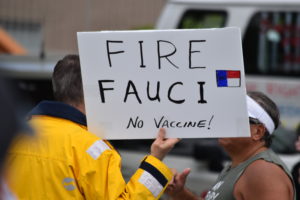
Kristin Homolka said Trump should fire Anthony Fauci, the director of the National Institute of Allergy and Infectious Diseases. She cited a conspiracy theory that Fauci is trying to profit from the pandemic and works with Bill Gates, whom she blames for hurting people with vaccines.
Fauci is on the leadership council of the Gates Foundation, which has worked to develop vaccines around the world.
But she said that vaccines funded by Gates have paralyzed thousands of people in India. PolitFact looked into that and said it’s not true.
There were about a half-dozen health care workers who had their own counter-protest. They stood mostly silent, wearing masks and smocks.
The vast majority of ReOpen NC protesters did not engage with them. But some did – and it got ugly. Sarah Baucom of Raleigh had her son in a stroller with her. She said one of the counter-protesters told her – as a warning — that she has had to intubate a child the same age as him.
She said she told her to “intubate this,” and extended her middle finger.
As far as social distancing, protesters at times tried to follow the lieutenant governor’s advice about staying apart.
But at one point during the rally, there was a logjam of 100 people at the intersection of Jones and Wilmington streets near the Capitol.
During the first ReOpen NC rally, one person was arrested, and the Raleigh Police Department Tweeted that “protesting is a non-essential activity.”
Outside Help?
After that rally, the Wisconsin law firm Michael Best — where former Trump White House Chief of Staff Reince Priebus is a strategist – offered to help the group. The firm got an assurance from the governor that protesting was OK, so long as participants maintained social distance.
There were no arrests at the second rally.
ReOpen NC got a lift from the larger conservative movement as far as pushing the governor on those protest assurances. But ReOpen NC’s organizers are trying to distance themselves from anything that would make the group appear not to be grassroots.
Leading up to the ReOpen NC protest, conservative Tim D’Annunzio offered to pay for buses to bring people to Raleigh. He’s probably most known for running for Congress in the 8th District in 2010 and hosting a machine gun social.
WRAL reported that ReOpen NC had said a “generous donor” was paying for the buses, but one of the group’s organizers, Smith — who was arrested this week — said the group didn’t accept his help. She said it wasn’t worth the hassle and scrutiny.
The other news from ReOpen NC is that one of the group’s most prominent members – who administers the group Facebook page — said she had previously tested positive for COVID-19. She said she hadn’t attended any of the rallies but was planning to attend Tuesday’s march because her quarantine ended Sunday.
And there is a planned march in Charlotte on Friday, May 1.
A New Tea Party?
Theda Skocpol, a Harvard professor who co-authored the new book “Upending American Politics,” said the ReOpen movement has some similarities to the early rise of the Tea Party in February 2009.
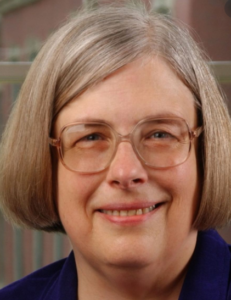
“There were national conservative groups that were sort of taking advantage of the rant that occurred on television and encouraging local activists they were connected to create rallies,” she said.
Freedom Works is one of those national groups. It played a key role in the Tea Party movement. But that’s where she sees the comparison to the Tea Party ending. And she points out movements can be both grassroots and orchestrated at a national level.
“Everybody says it’s either Astroturf or it’s genuine,” she said, using a grass metaphor. “Come on. That’s not how social movements work.”
She added: “Are there people who feel passionately about particular causes at the grassroots who are joining in? Of course there are. And some of them are organizing their peers on their own. But they are going to places that are being suggested by the president and by Freedom Works and other national orchestrators. And in this case, there’s a very clear effort to target governors who are Democrats — sometimes Republicans, but usually Democrats — and suggest that they aren’t really in favor of opening the economy or constitutional liberties. That’s a political message. And it’s meant to play into the elections this fall.”
Skocpol thinks it will die out – as soon as there are MAGA rallies again.
“I think it’ll burble on until President Trump can do big rallies again, which means maybe all the way till fall because I don’t think this pandemic will be over until there’s a vaccine,” she said.
A CBS News poll published last week found that 70% of respondents said the country’s top priority should be to “try to slow the spread of coronavirus by keeping people home and social distancing, even if the economy is hurt in the short term.”
But what if we do reopen and the virus is somewhat contained — but the economy doesn’t bounce back?
Dan Forest Talks About The Virus And Reopening
Lt. Gov. Dan Forest’s first foray into COVID-19 politics came in late March, when he questioned Cooper’s order to close bars and make restaurants delivery and take-out only. He sent a press release saying the decision would “devastate” North Carolina’s economy, which appears to be true.
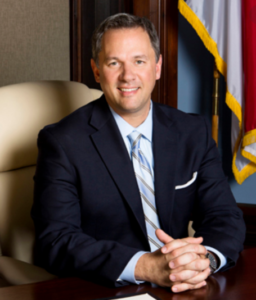
But he didn’t mention anything about whether the governor’s action was necessary to slow the spread of the virus.
Forest said he was upset about Cooper’s process. The 10 elected members of the Council of State – of which he’s a member – didn’t approve of the decision.
“We got an email that said you need to concur with this decision,” Forest said. “And immediately I just said, ‘Are you really asking us to concur with something that has already been announced?’ And then we went through the process through email of concurring or not concurring. And the Council of State did not concur.”
Today, Forest said he wasn’t necessarily opposed to the actual decision.
“The point was that the Council of State had about a window of about an hour to make a decision on that issue, which we had no information on,” he said. “There was no consultation. There was no meeting, no nothing; just do it.”
Cooper announced the statewide stay-at-home order on March 27. We asked: In hindsight, did the governor make the right decision?
“Well, you know, the big counties already made that call anyway,” Forest said. “So, you know, it was already happening across the state on a county-by-county basis. I’ve really never questioned any of these decisions, quite honestly. I mean, you can go look back, I’ve just said, ‘Listen, we just need more information and more information is better.’ And if you’re in this situation, you have info we don’t have, I will trust that at the time, that was the decision that the governor needed to make.”
Forest and other Republicans are pushing for the release of more data. They want to know things like who has recovered from the virus, and how many of the new positive cases are symptomatic.
He said the media at times haven’t presented the full picture of the pandemic. And he said the state needs to release more information.
“But you know, out of 500 inmates in a prison that have gotten this, 2% of them are symptomatic,” he said. “So you can skew the numbers, you can kind of skew the data by not having all the information. So if you took out all the prison population, for instance, and say, well, the stay-at-home order doesn’t affect that at all because they are they’re already distanced and they’re not in contact with the public. So those numbers are skewed.”
It’s true that the prison population is isolated from the rest of us. But the people who work there aren’t — just as the people who work in nursing homes come and go.
Forest wants to know information from the state about who has been hospitalized: Did they have preexisting conditions?
“Then you can start to look at the subsets and you can break them down and say, ‘How do we protect our most vulnerable populations, and then move on with a plan based on protecting the people that we absolutely need to protect?'” he said. “I think we know what that information is. But we have never seen that released.”
He said that once more information is released, it might show that the COVID-19 pandemic is more like the flu.
“You get more and more data and more information and you start to view that against previous pandemics and previous flus and those types of things,” Forest said. “You know, the hope is that when this is all said, and done, as bad as it is that it’s like a bad influenza season, you know, I think that’s what would be great of it. It goes through this thing and ends and we can look back and go, that was a bad flu, and that it doesn’t spike again and all those kinds of things.”
Comparing COVID-19 to the flu is controversial, so let’s unpack that comment.
Today, the mortality rate in the U.S. from COVID-19 is 5%. That’s of course astronomically higher than the flu, which is roughly .1%.
But there have been studies that indicate that the coronavirus is much more widespread than the confirmed cases.
There was a Stanford University study in Santa Clara County, California, that projected COVID-19 is everywhere.
At the time of the study, the county had 2,000 cases and 90 deaths. The Stanford study — which has been criticized — found antibodies in far more people, and it said between 48,000 and 90,000 people in the county might have had it. If that’s true, it drives down that mortality rate to flu-like levels.
But there are questions.
Even if 15 or 30 or 50 times more people have had COVID-19 than we realize, the virus spreads so quickly that it can overwhelm hospitals, like it did in Italy and New York City.
And researchers and journalists have found a surge in so-called “unexpected, unexplained deaths” nationwide around the time the outbreak took off in the U.S.
And since late September, there have been nearly 180 flu deaths in the state. North Carolina says it’s had 378 COVID-19 deaths as of Thursday since what’s recognized as the first death in late March.
Those COVID-19 deaths came all within five weeks, at a time when the state has taken extreme measures with a stay-at-home order.
The lieutenant governor talked about a divide in the state.
“Right now you have the people that are working from home and they’re kind of hunkered down and they still get their paycheck,” he said. “So they want to stay hunkered down because their life hasn’t changed all that much. They’re working from home like they’re able to do. And then you have all these people that have lost their jobs, and they don’t have any money.”
We asked Forest: Is ReOpen NC the new Tea Party?
“You know, I don’t know,” he said. “It’s interesting. I think there is a broader, ideological cross-section here. You know, the ideological cross-section of the Tea Party movement was constitutional conservatives that we’re just kind of tired of not being heard, kind of thing. I think this one’s not just conservative.”
The idea of getting the economy started again likely has broad appeal. But the protest was extremely partisan.
Forest doesn’t plan on going to the rallies — he said “he’s no activist.”
At the rally, there were only a few people wearing masks. We asked Forest whether he would tell people to wear masks.
“I don’t know,” he said. “I would tell them to social distance, is what I would do. I think the case for the mask is good if you’re gonna be around people and you’re gonna be close to them and all that kind of stuff. I would say social distance if you’re not going to wear the mask, and allow people to make those decisions.”
Forest then talked about his discomfort with government interference.
“I think that’s just generally where personal responsibility comes in — and we can’t rely on the government to fix (everything),” he said. “The U.S. government’s not going to fix this problem. It’s going to be the responsibility of the people to fix this problem far beyond a lockdown, far beyond this season or anything else.”
He added: “I mean, what happens if there is no vaccine? You wouldn’t have a vaccine for HIV/AIDS. …And people have learned how to create drugs to fix it. We got to get the economy going so we can get innovation going. So we can spark the innovation to the American people so they can get out there and start to fix this, but it does take personal responsibility as well.”
So What Should The Government’s Role Be In Getting Out Of This?
On one hand, Forest said he supports a data-driven approach — similar to what the White House and Cooper have suggested. But he wants it to be on a county-by-county level.
“If Mecklenburg County needs to remain on shutdown for some longer period because their projections are still going up and they don’t meet these criteria, then you can do that,” he said. “I would prefer not to punish the entire state on lockdown because the majority of the cases are in a few places.”
But Forest also seemed uncomfortable with the government setting those criteria. We asked: What should the role of government be?
“Listen, I think the moral solution here is the government, obviously, this thing comes along, government tells people you have to shut your businesses down. I think the moral play is that you have to help support those people that have lost their jobs and lost your businesses, this is going to be an expensive venture,” he said. “And it’s not just gonna take six months to come out of this. It’s going to take, I think, years to recover just from the financial component of it long-term.”
He continued: “My purpose of saying the government’s not going to fix it — it’s not going to fix it by telling us how to run our lives. That’s not the spirit of America. That’s not what made this country great. And it’s not going to work here, you know, so, we need to let people get back about their lives in a responsible and safe way.
“You know, America was caught off guard. North Carolina was caught off guard or cities were caught off guard or schools were caught off guard,” he said. “We have to be we have to come out of this prepared for the future. We need to have masks on hand, we need to have all the PPE equipment, the ventilators. Our hospitals need to be prepared, we need to have a plan for how this goes down or any other kind of pandemic. So, chalk this up to a very costly lesson to be learned.”
He said the state has a role in helping businesses and people hurt by the shutdown.
“I’m sure they’ll do some tax implications stuff where people aren’t getting punished for their, you know, extended tax returns and having to pay interest on those kinds of things,” he said. “And certainly, there’s going to be some unemployment help, some significant unemployment help.
City Council Has Another 6-5 RNC Vote
On Monday, the Charlotte City Council voted 6-5 vote to accept $50 million in federal security money for the Republican National Convention.
That 6-5 vote was the exact vote in 2018 when the city voted to host the convention, although there are now two new council members – Victoria Watlington and Renee Johnson.
Council members like Matt Newton said they didn’t want the city to become a super-spreader of the virus.
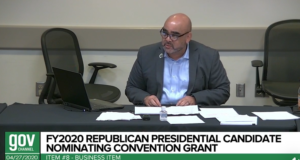
But the narrow majority noted that if the city turned down the money, they would be on the hook for whatever security costs the city incurred. So even if it’s a stripped-down convention — with a fraction of the people attending — there will be security costs.
And Charlotte taxpayers would have paid them.
Click here to subscribe to the Inside Politics podcast (and to give the podcast a rating/review in your favorite podcast app).
Want more? You can sign up here for our weekly Inside Politics newsletter, written by Steve Harrison.
Have a question about the 2020 RNC in Charlotte? Ask us below.